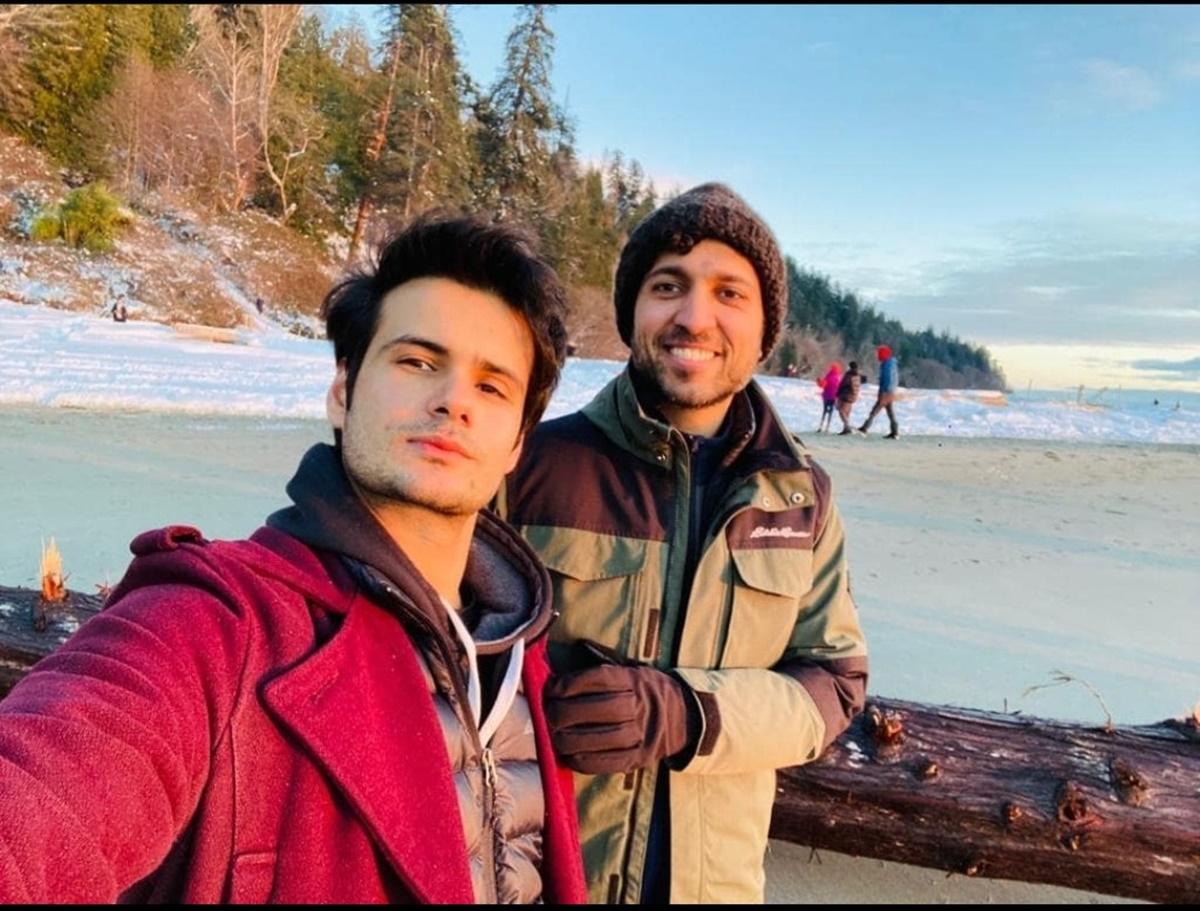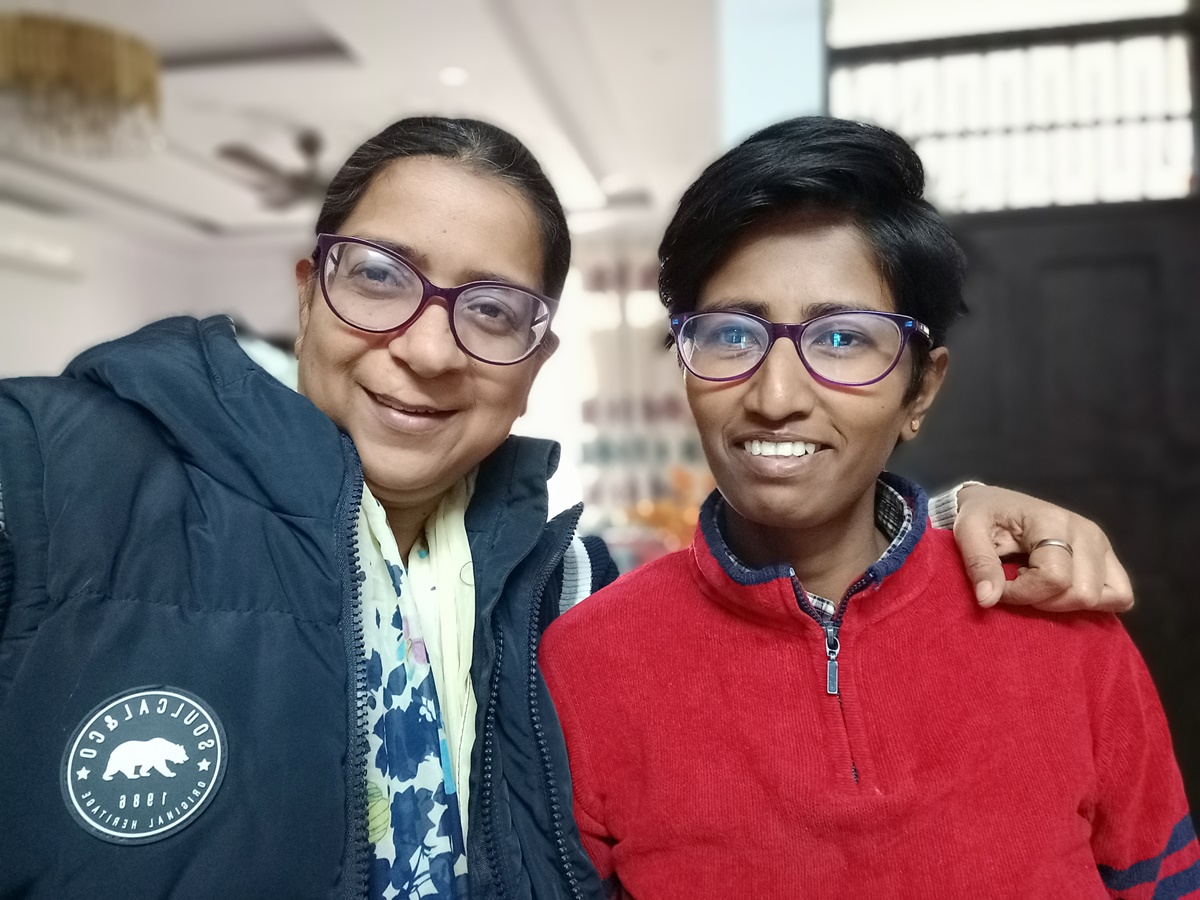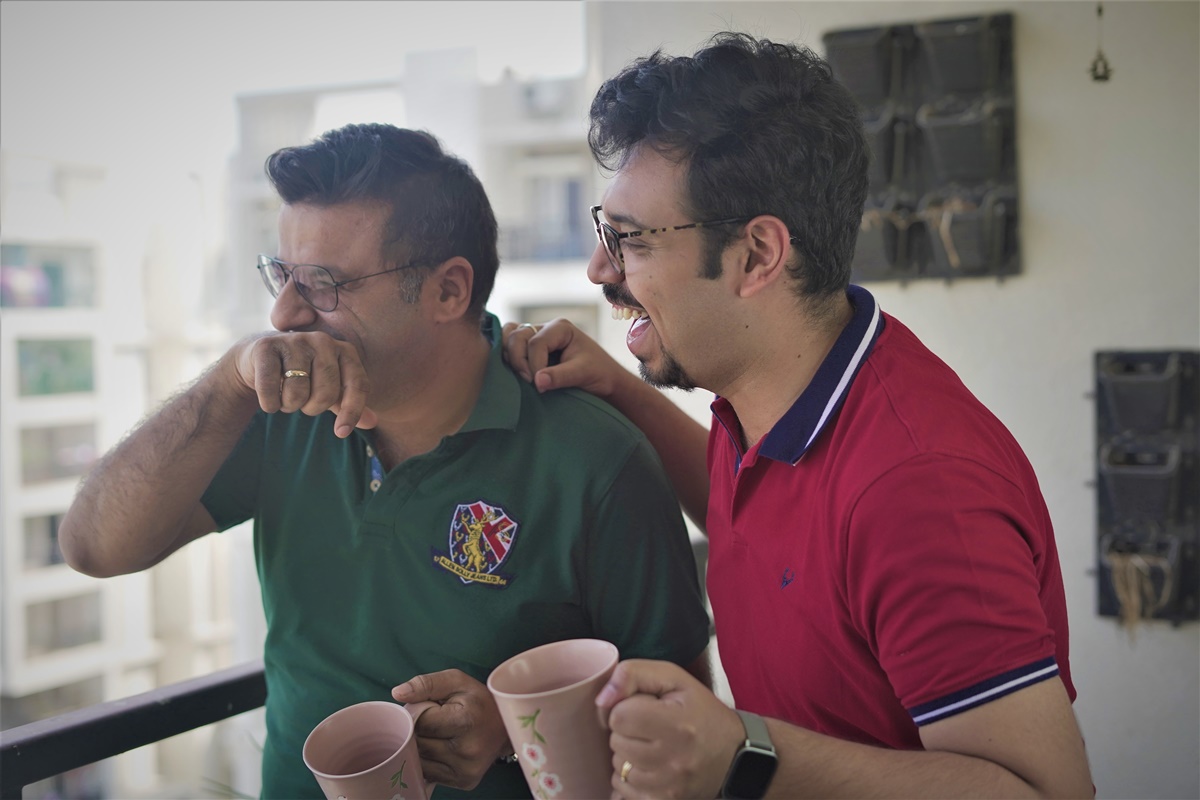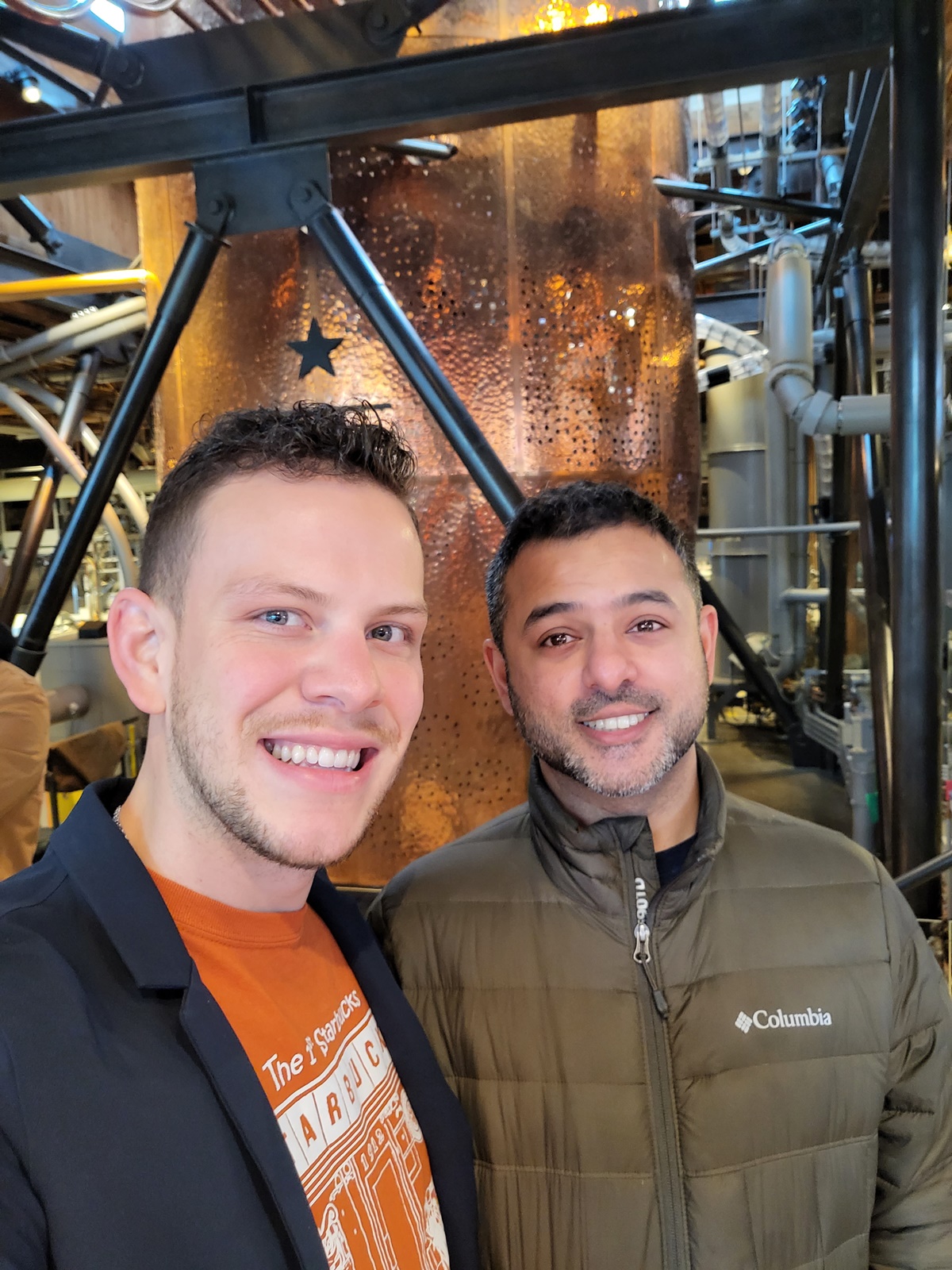Saattvic had no plans to go to the New Year’s Eve party. It was a cold night on December 31, 2014, in the City of Dreams, and it had been a tough few months for him. He had been excited about acting in a new play, but that arrangement had just fallen through, and he was left without any acting work. Dejected, Saattvic met a casting director friend who was surprised at how depressed he was. To cheer him up, he asked him to join his colleagues from a major production house at a party in a Versova bar — a hub for aspiring actors in Mumbai.
“I was in the closet back then,” Saattvic, 37, recalls, “You weren’t supposed to tell people you were gay. Otherwise, you’d only get gay roles.” Saattvic made sure to keep his homosexuality under wraps at the bar. Once there, between sipping drinks with his friend, he watched the people walking in through the doors. That’s when Saattvic saw his future partner for the first time.
 Sattvic (behind) and Gaurav Bhatti (front). (Courtesy: Sattvic and Gaurav)
Sattvic (behind) and Gaurav Bhatti (front). (Courtesy: Sattvic and Gaurav)
Gaurav Bhatti, who was then 25, had landed in the city only that morning. He had flown in from Toronto with his Kathak and contemporary dance group and was supposed to head to Ahmedabad the next day for a music festival. He stopped by at a NYE party and met an extremely attractive aspiring actor. They immediately hit it off. He and Saattvic were both artistes and had little trouble relating to each other’s woes and aspirations, and on a whim, decided to take a bus to Ahmedabad together. Saattvic recounts the next few days with dreamy-eyed nostalgia: their first dates were classical music concerts and first conversations were over kulhad wali chai. On January 16, Bhatti met Saattvic’s parents. By March, they had moved in together.
“Since then we’ve been joined at the hip!” says Saattvic. Today, he is an economist with a consulting practice in antitrust and competition law. He also acts in plays and TV commercials, writes and produces, and juggles all these with managing Bhatti’s fledgling dance career under senior dancer Aditi Mangaldas. Another one of his endeavours? Legalising gay marriage in India.
Saattvic’s was one of nine similar petitions pending before Indian High Courts until November 2022, when they all got transferred to the Supreme Court. Four cases were already pending there. Subsequently, there’s been another, and together, the 14 cases will be heard from March 13 in what will be one of the most high-profile cases in India’s legal history, argued by advocate Arundhati Katju, senior advocates Menaka Guruswamy and Saurabh Kirpal, among others.
This is a landmark moment for India’s queer community. The 2017 Justice KS Puttaswamy judgment recognised sexual identity as a private matter that is everyone’s right. The 2018 Navtej Singh Johar judgment decriminalised same-sex relations between consenting adults. The Transgender Persons (Protection of Rights) Act, 2019 — with its many shortcomings — built upon the 2014 NALSA judgement to provide fundamental rights to the trans community. Now, marriage is on the table.
Pooja Srivastava, 46, and Nibedita Dutta, 40, one of the petitioning couples, explain why marriage is an important step for their four-year-old relationship. First, there is the utilitarian side. They own an apparel business and live together. Without being legally married, they can’t nominate each other in life and health insurance policies, they can’t transfer money to each other tax-free, they can’t set up a joint bank account as a family.
 Pooja Srivastava (left) and Nibedita Dutta (right) (Courtesy: Pooja and Nibedita)
Pooja Srivastava (left) and Nibedita Dutta (right) (Courtesy: Pooja and Nibedita)
Then there is simply the intimate, day-to-day side. Srivastava and Dutta have been together since they confessed their feelings, after two years of talking on Facebook. They have gone through petty frustrations, like one person in the relationship being hyper-punctual (Dutta reaches every destination five minutes before time) and one being tardy (Srivastava starts getting ready by then); they have faced their family’s initial opposition to their relationship (when the couple was coming out to Dutta’s father, he said their dynamic is “already understood and obvious, so what’s the need to call it out separately?”); they have supported each other through a once-in-a-millennium pandemic, when Srivastava’s business suffered a huge loss and Dutta’s father died of a respiratory disease; they negotiate different eating habits (Srivastava is too nitpicky, Dutta eats everything) and rescue stray animals together.
After all that, and more, when the couple is forced to write “single” under columns of marital status in official documentation because they are legally unmarried, they feel like they’re being untrue to themselves. “What’s more?” adds Dutta, with a laugh, “On government documents, we have to sign that everything said above is true. It’s ridiculous.”
The pandemic fast-tracked a lot of ambitions. For Abhay Dang, 36, and Supriyo Chakraborty, 32, another petitioning couple, both of them got COVID in the second wave — which hit home life’s unpredictability. “If something happened to me, Supriyo wouldn’t be able to make any medical decisions for me,” says Dang, currently working as a software developer at Amazon. “I would be nothing to him legally.”
 Abhay Dang (left) and Supriyo Chakraborty (right) (Courtesy: Abhay and Supriyo)
Abhay Dang (left) and Supriyo Chakraborty (right) (Courtesy: Abhay and Supriyo)
This was the summer of deaths across the nation, and hospitals being rained with rose petals but no money. It had already been a decade since Dang and Chakraborty met on PlanetRomeo, a queer social network. Their first date was supposed to be half an hour and lasted seven. Once a wedding was on the horizon, it was always going to be big and fat — but it was no longer going to be put off.
December 17 and 18 were the dates chosen, and Chakraborty — who Dang admits is the creative one in the relationship — swooped into planning. He was in constant touch with the event planner and planned every minute of every day leading up to and including the wedding. Everything went off seamlessly. In fact, he was so good that Dang suggested he start an event management business. And Chakraborty did, just four months after the wedding.
For Utkarsh Saxena, 34, and Ananya Kotia, 32, a couple who directly petitioned the Supreme Court, nurturing each other’s goals came naturally — even when those goals included multiple long-distance commitments through each other’s Master’s and Doctorates at Oxford, Harvard, Cambridge or London School of Economics. They met at Hansraj College, Delhi University in 2008 as two young undergrads (both were active debaters and interested in politics and economics). A romance bloomed and they’ve been together since. “Early on, we knew we were gonna be together. We knew that this companionship was really important for both of us and we put in extra effort,” says Saxena, pursuing a PhD in public policy at Oxford. “We’re ambitious about each other, not just about ourselves,” says Kotia, doing his PhD in economics at LSE.
They were born into families of public service. Kotia’s father was in the Indian Administrative Services and Saxena’s in the Navy. But growing up, despite their academic excellence, they felt a hopelessness lurking in their achievements because of their sexuality in a homophobic country. “We’d think, what’s the point of working hard when our personal and professional lives would never click together?” says Kotia. “After fighting this battle alone for so many years, we met each other in college and connected over a common story of insecurity and apprehension.”
For most of these couples, what has worked in their favour is that they come from upwardly mobile families, where acceptance, at least, from within the family, has not been particularly hard to come by. But they acknowledge that not everyone is as privileged or as fortunate. Shame, crippling loneliness, ostracisation, or worse, continue to plague less fortunate couples. That’s the barrier they truly want broken. Kotia and Saxena are often advised to seek careers abroad in more progressive countries, but they always refuse. They want to stay in India and improve things here, “even if,” says Saxena, “it means giving up the personal life we dreamed of.” Their petition aims to break past the class barrier and make accessible basic rights to all members of the LGBTQIA+ community. “Our relatives would always say, you’re our perfect baccha, you’ve achieved so much despite your relationship,” says Saxena. “I always respond, it’s not despite the relationship, it’s because of it.”
If their relationship began in a serpentine unison of academic and professional interests, that of Aditi Anand, 39, and Susan Dias, 35, another petitioning couple, couldn’t be an uncannier coincidence. In 2012, after being born and raised in Delhi, Anand moved to Bombay to pursue filmmaking. Dias, on the other hand, a true-blue Mumbaikar had just finished her chartered accountancy training recently. She was working at Ernst & Young when, one day, she attended a queer book club’s first meeting and met Anand. They couldn’t be more different. Their circles and interests reflected the galaxy-wide gulf between the liberal arts and finance. But both had recently bought a smartphone, there was a new app that was all the rage called WhatsApp, and they got to talking.
 Aditi Anand (right) and Susan Dias (left) (Courtesy: Aditi and Susan)
Aditi Anand (right) and Susan Dias (left) (Courtesy: Aditi and Susan)
“Susan really made me laugh,” says Anand. “What I liked most about her was that she didn’t take me seriously at all, not my melodrama, not my over-the-top emotions.” Dias contributed a complementary reason: “What stood out for me was Aditi’s kindness and big-heartedness. I haven’t met anyone who has as much space in their life for others.”
They didn’t take long falling in love. Soon after they met, before moving in together, Anand’s friend WhatsApped her a picture of a Labrador puppy who was not in great shape and up for adoption. Though she loved dogs, Anand would never go for it; she didn’t expect Dias to either, given how “deathly” afraid of dogs she was. “I was telling Susan about the picture,” says Anand, “and how taking care of a puppy is so much responsibility. Then she suddenly said, ‘Let’s adopt this dog.’”
While this itself was a big step for Dias, she was preparing to take bigger ones outside home. In 2018, she quit her lucrative CA career to start a business of indigenous spirits and wines — a decision she credits to Anand’s encouragement: “Because of her, I explored other parts of my life and the world.”
While their relationship required the bridging of a professional distance, that of Udit Sood, 34, and Andrew Ryan Hall, 29, requires bridging a political divide. Sood, who petitioned the Delhi High Court two years ago before its transfer to the Supreme Court, is a lawyer who migrated to San Francisco in 2014. A few years ago, Hall, a Reno-based trust officer, visited San Francisco on a weekend trip and met Sood. Their first date went well and Sood even flew over to Reno the following weekend, but differences soon emerged.
 Udit Sood (right) and Andrew Ryan Hall (left) (Courtesy: Udit and Andrew)
Udit Sood (right) and Andrew Ryan Hall (left) (Courtesy: Udit and Andrew)
“My family isn’t as conservative as Andrew’s,” says Sood, referring to his partner’s upbringing in the American South. “My friends and family in India are far more understanding and supportive than the people he grew up around, who are deeply religious and at some level continue to believe that Andrew has lost his way.” Hall recounts a difficult weekend with his mother and Sood when she communicated her disapproval for their relationship. Though things are improving, there’s still a long way to go.
But Sood and Hall maintain that these differences strengthen their relationship. Sood lauds Hall’s ability to find love and empathy in even the most disagreeable political viewpoints. He says, “I respect how Andrew thoughtfully engages with adversaries and can articulate other people’s position minus all the hate and tension.” Hall adds, “Udit always finds ways to challenge me intellectually and offer differing perspectives. I never get bored.”
Sood’s mother, Dr. Mini Sood, says she supports his relationship and petition wholeheartedly, adding, “He is brave enough to change the lives of many people.” His father, Dr. Suneet Sood, says, “As a parent, you sometimes want your child’s safety more than their happiness… but Udit’s a strong chap, and he fights his battles well.”
Sood frequently returns to India and feels that there remains an atmosphere of fear and shame. “Until queer kids growing up in India are comfortable sharing their truth with their family and friends, we don’t have LGBTQ rights. Right now, too many gay Indians are scared, choosing even to marry individuals of the opposite sex and commit to a life of dishonesty. Our government should invest in the queer community, promote understanding and celebration of queerness, and foster an environment where all Indians can thrive and contribute to the nation’s future.”



































